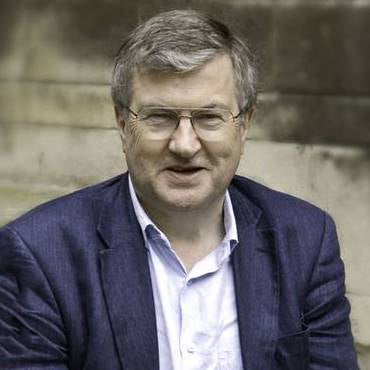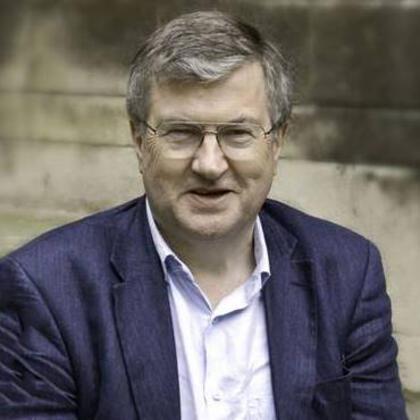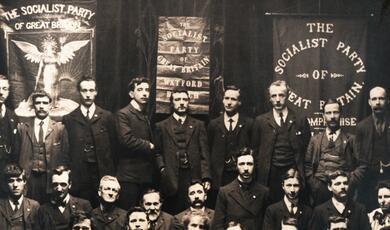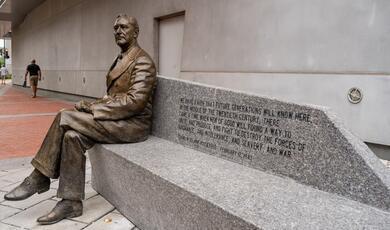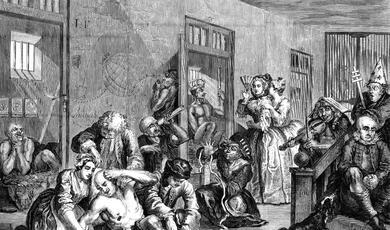Conspiracy Theories: A Threat to Democracy?
Share
- Details
- Text
- Audio
- Downloads
- Extra Reading
Conspiracy theories seem to be everywhere nowadays, encouraged by the internet, and perhaps also by postmodern scepticism. But are they really more common than they used to be, and if so, do they constitute a threat to democracy, as a number of commentators have argued? Are they indeed more prevalent in democracies than in dictatorships?
This lecture looks at recent and current research to come up with some surprising answers.
Download Text
16 June 2016
Conspiracy Theories:
A Threat to Democracy?
Professor Sir Richard Evans FBA
We live in an age of conspiracy theories. They seem to be everywhere. No sooner does some major event occur then the conspiracy theorists get to work on it. 9/11? A plot by Mossad, the CIA, or the US government. 7/7? The moon landings? Staged in the American desert or in a TV studio or in a museum in order to fool everyone into thinking they were real. Global warming? A myth invented by scientists to get big research grants for themselves and increased government control over society– or alternatively, a reality that’s only challenged by scientists working secretly for oil companies and coal mining corporations who are conspiring to deny established scientific fact in order to bolster their own profits. Conspiracy theories like this, almost everyone seems to agree, are more widespread and more pervasive than they have ever been before. And one thing they seem to have in common is a deep suspicion of government. We may be told officially that the MMR vaccine gives our children protection against dangerous diseases, but the conspiracy theorists know that in fact it causes autism, a fact they allege is being covered up by a conspiracy hatched between government and medial scientists.
The coming of the Internet, it’s widely argued, has been the main force behind the spread of such theories, and they’re undermining trust in political systems, even causing people increasingly to question the fundamentals of our democracy. In the USA, for example, trust in the elected President, Barack Obama, has been undermined by the spread of the idea that he and Democrats have conspired to cover up the fact that he was not born in America and was therefore not eligible for election. The Bilderberg Group of senior world statesmen is a cover-up for the creation of a New World Order, in which national democracies are being replaced by a global dictatorship. Prime Minister David Cameron is part of the plot, connected through his wife’s stepfather to the sinister forces behind it, including the Freemasons and the Illuminati. The Queen and the entire British government, indeed the ruling elites of the world, are in fact flesh-eating green lizards from outer space conspiring to take over the globe and concealing their true identity by disguising themselves as humans.
These are only a few of the conspiracy theories that are swirling around on the Internet, propagated through books and articles, and endlessly discussed in clubs and societies, pubs and bars in countries all over the world. Our interdisciplinary project Conspiracy and Democracy, based in Cambridge at the Centre for Research in the Arts, Social Sciences and Humanities, and funded by the Leverhulme Trust, brings together historians, political theorists, philosophers, anthropologists and internet engineers to investigate this phenomenon. Three and a half years into the project, and thanks not only to our own research but also to that of the many visiting fellows who have come to speak to us and discuss their ideas with us, we are beginning to find our way towards some answers, some of which involve, as is always the case with research, revising the hypotheses we started out with at the beginning of the project.
Let me address five widespread beliefs about conspiracy theories: that they are a new phenomenon; that they are the product of the Internet, or of postmodern relativism, or uncertainty about the truth in the face of the knowledge overload we’re all suffering from, or an attempt to reduce complex explanations to a few simple formulae; that they belong in the realm of fantasy and are always the product of a paranoid imagination; that they are particularly prevalent in democracies; and that they all fundamentally follow the same patterns and structures of thought. After saying a bit about each of these beliefs, I’ll conclude with an assessment of how conspiracy theories relate to democracy, and whether they constitute a threat to it.
I’ll begin by asking whether conspiracy theories are a new phenomenon, spread perhaps by the Internet. As soon as we start to look back in history, we immediately have to recognise that they are not. The assassination of US President John F Kennedy in November 1963 immediately became the object of an enormous number of conspiracy theories, for instance, long before the Internet came into our lives. Already within months of the assassination, nearly half of all Americans polled thought that Lee Harvey Oswald had not acted alone; by 1983, twenty years after the assassination, this proportion had climbed to 80 per cent. If anything, the advent of the internet actually reduced the prevalence of conspiracy theories about the death of the President, which towards the end of 2013, fifty years on, were believed by 62 per cent of Americans.
But conspiracy theories have a much longer history than this. The great French Revolution of 1789-1794 for example, was permeated by them, from Robespierre’s accusations that his enemies, such as Danton, were conspiring with the British to overthrow the Revolution, to the so-called Great Fear, when peasants were inspired to rise up and attack landowners and their castles in the belief that they were engaged in an aristocratic plot to murder them. Even earlier, political life under the French monarchy was shot through with rumours about political plots and machinations behind the scenes. Even seemingly stable political systems have been prone to such beliefs. Secret societies and conspiracies, British Prime Minister Benjamin Disraeli lamented in 1856, ’cover Europe like a network’: ‘Acting in unison with a great popular movement’, he went on, ‘they may destroy society, as they did at the end of the last century.’
It was fear of a repetition of the great French Revolution of 1789-1794 that inspired such paranoia. Prince Metternich, the conservative statesman who devoted his career to trying to maintain the status quo, called the secret societies ‘a real power, all the more dangerous as it works in the dark, undermining all parts of the social body, and depositing everywhere the seeds of a moral gangrene which is not slow to develop and increase’. Only close co-operation between the Great Powers of Europe, he told Tsar Alexander I in December 1820, could ward off the threat. The whole of Europe was being undermined by the plots and conspiracies of secret organizations such as the Carbonari. ‘Among peoples which are sick’, remarked one of Metternich’s allies in 1815, ‘you find conspiracies’.
It follows that conspiracy theories don’t actually seem to have become more prevalent with the invention and spread of the Internet; ever since the arrival of print in the age of Gutenberg and Caxton, conspiracy theories have been spread in books, pamphlets and broadsheets, but conspiracy theories can equally be spread by word of mouth; during the devastating plague of the Black Death in 1349 rumours that it was caused by a Jewish plot to poison Christian water-supplies led to pogroms across Central Europe, spreading from town to town, especially along the River Rhine; while in the Great Fear of 1789 the idea that the aristocracy was plotting to rid itself of the peasantry in France was spread from village to village by word of mouth, as Georges Lefebvre showed in his classic study.
There have always been conspiracies. Ever since human society came into being, some of their members have gathered together in secret for some illicit purpose they wish to conceal from society as a whole. Secrecy is an essential element: not only must nobody know the purpose of the conspiracy or the identity of its members, they must not even know it exists: it has to be, to borrow the categories invented by former US Defense Secretary Donald Rumsfeld, an unknown unknown. And as long as there have been conspiracies, there have been conspiracy theories.
Nor, to come to my second point, are conspiracy theories be the product of postmodern uncertainty or relativism about truth? In fact, conspiracy theorists resolutely insist that there is nothing uncertain or relativistic about the truth at all, and you never find them citing Foucault or Derrida. Central to the whole genre of conspiracy theories is a sharp and uncompromising distinction between truth and falsehood. The allegedly official line is dismissed as false, while the beliefs of the conspiracy theorists are presented with every appearance of sincerity as the unvarnished truth. Often enormous edifices of empirical detail are constructed to back up this assertion; if you think that conspiracy theories are a way of reducing the complexity of the modern world and the information overload to a simple formula, you only have to look at the painstaking compilations of evidence assembled by the advocates of almost any conspiracy theorist to realise you’re wrong.
But, to come to my third point, conspiracy theories aren’t always or necessarily wrong. Many of them were no mere fantasies but had, and sometimes still have, a basis in the truth. Our project looks at the relationship between conspiracies and conspiracy theories as a central part of its work. In the 1820s, secret societies did indeed proliferate. Some, like the Carbonari in Italy and France and the Burschenschaften in Germany really did plot revolutions, of which there were a great many in Europe in the course of the decade, most of them unsuccessful but some of them not. In Britain, the Cato Street conspiracy, in which Thistlewood and his fellow plotters planned to assassinate the entire Cabinet, provided an equivalent, and in all cases, the activities of police spies and infiltrators served only to increase the sense of paranoia all round. In our own time, some conspiracies about key events have indeed turned out to be true: the destruction of New York’s twin towers in 2001 was the result of a conspiracy hatched within Al-Qaeda; the break-in to the Democratic Party Headquarters in the Watergate Hotel in 1972 was the result of a conspiracy hatched in President Nixon’s Oval Office; the bombs that went off in London on 7 July 2005 were the result of a conspiracy hatched by British-based Islamist extremists. Some major events are indeed the product of small groups of people meeting in secret to plan them. Machiavelli was so convinced of the reality of conspiracies as a standard instrument of the politics of Italian city-states in Renaissance Italy that he devoted a whole section of his Discourses to discussing them. So conspiracy theories don’t necessarily belong in the realm of fantasy; if we investigate them carefully, some of them turn out to be right, a fact not unrelated to the strong support such well-supported conspiracy theories have in public opinion polls.
Are conspiracy theories, then, an inevitable product of democracy, where everyone is free to put forward their own explanations of major current events? In fact, we know that conspiracy theories have also been widespread in dictatorships and authoritarian regimes. Paranoia in government circles about conspiracies rooted in the revolutionary discontents of the people has in fact been strongest after major revolutions. Governments feel insecure, and while some of their fears were genuine, they also used them as a technique of repression: hence the infamous Carlsbad Decrees, press censorship, a transnational network of political police, and the rest of the paraphernalia of authoritarian government that characterized the 1820s and prompted radical cartoonists to portray journalists and writers wearing muzzles and asking rhetorically: ‘How much longer are we to be permitted to think?’.
A century later, a few years after the Russian Revolution, Stalin invented huge conspiracies, led by capitalist engineers, or Trotskyites, or Tsarists, to cover up the failures of his collectivization policy, and to eliminate potential rivals to his personal rule, and dramatized them in show trials during which the accused, often long-term ‘Old Bolsheviks’ who had worked with Stalin for many years, confessed to having conspired against the Russian Revolution from the outset. A dictatorship like that of Hitler banned all political organizations apart from the Nazi Party and forced all organizations, including the press and news media, to close down or be turned into Nazi organizations, forcing his critics and opponents to go underground and work conspiratorially, even if it was only to produce leaflets and pamphlets for secret distribution during the night, or merely to keep the flame of communism or socialism burning until better times came. Where open dissent and criticism is impossible, the only way to oppose the government is by forming a secret society or a conspiracy.
For Metternich, Stalin or Hitler, positing a conspiracy was a convenient and intellectually easy way of accounting for opposition or getting rid of it by portraying it as the tool of secret and malign forces. Creating a fear of conspiracy could be a way of summoning one up: during the French Revolution. Robespierre denounced conspiracies with growing frequency and intensity, declaring that the only way to stop a conspiracy was to cut off its head; eventually, as his reign of terror threatened to consume everyone, a real conspiracy formed which overthrew him; it was Robespierre who lost his head, not the conspirators. Conspiracies as well as conspiracy theories can be the products of dictatorship as well as democracy. History is of course littered with secret plots to overthrow democratic political systems, notably in the 1960s and 1970s with the coups d’état that established military regimes in many South American countries, notably Chile, as well as in Greece. But the very existence of a dictatorship or an authoritarian regime acts as a spur to its enemies to get together behind the scenes to overthrow it.
Such events very frequently seem to inspire conspiracy theories, which brings me to the final point in my list. Whether they are true or not, conspiracy theories are often thought to follow more or less the same pattern. Thus for example they often cluster round major political events or crimes, which they frequently interpret as the outcome of a plot, an intention or aim pursued in secret by a small number of conspirators. Yet for example when we look back at the numerous examples in history of the assassination of leading political figures and heads of state, we find that most of them have involved lone individuals, rather than groups of conspirators, even if they have been acting in the name of some wider ideology such as Catholicism, anarchism, or nationalism. Often it seems to many people impossible to believe this fact; hence the conspiracy theories that have swirled around the assassination of JFK, or around the burning-down of the Reichstag, the German Parliament, on 27 February 1933. As the building blazed away, Hitler, the titular head of a coalition government, saw his opportunity and had a decree passed suspending all civil liberties until further notice, which in this case was until the Third Reich came to an end in 1945.
Conspiracy theories often start by identifying as the originators of an event or a phenomenon the people who benefited from it; thus although in this case the Nazis identified the Communists and justified their policy of throwing them into concentration camps by asserting that the Reichstag Fire was the first step in a planned seizure of power by the Stalinist far left, the Communists in turn argued that because the Nazis benefited from the fire they must have started it, a theory that they and their successors have been trying to prove ever since. In fact, there is no evidence to show that anyone was involved except a lone Dutch anarcho-syndicalist, Marinus van der Lubbe, who was indeed the only person found guilty in the subsequent trial. But it’s hard to accept that large consqeuences can come from individual actions, or that the creation of a dictatorship was based on the exploitation of an unintended and unanticipated event. Hence the Reichstag Fire must have resulted from a conspiracy, not from the actions of a lone individual.
The Reichstag Fire came at a transitional point in the destruction of the Weimar Republic and the creation of the Nazi dictatorship, so it’s not surprising that it generated two rival conspiracy theories, one formed by the government and directed against the people, or a significant part of them in the shape of the mass Communist Party of the day, and another formed by the Communists against the government. In Europe at least, democracies have generated conspiracy theories, but these have been directed particularly against government; democracy generates a public demand for transparency in government that can never be fulfilled, and government secrecy tends to arouse suspicion, which is then expressed in some cases in conspiracy theories. But it doesn’t seem that such theories are any more prevalent in democracies than in dictatorships, which are after all the least transparent of all forms of government.
What this points to is that conspiracy theories can take on a variety of forms and structures, to come to the final point in my list. In order to keep the aims, purposes, methods and membership of a conspiracy secret, it’s important that as few people are involved as possible; frequently conspiracies indeed have restricted the flow of information to their own members, for example concealing the identity of some of them from others. Police forces and agents of those against whom conspiracies are directed have frequently tried to infiltrate them in order to discover what they are doing and who belongs to them, so conspiracies have tried to ensure the loyalty of their members by the threat of retaliation against possible traitors, for example in the notorious Organisation Consul in the early Weimar Republic, which not only assassinated democratic politicians like Walther Rathenau but also killed its own members whom it suspected of betraying them to the authorities. The reductio ad absurdum of this is of course to be found in G.K. Chesterton’s satirical novel The Man Who Was Thursday, where all the members of a supposed terrorist plot turn out to be police agents, a fact that doesn’t stop them from engaging in pitched battles with one another.
In early modern Europe, and well into the nineteenth century, conspiracies cemented the loyalty of their members through sacred oaths and initiation ceremonies; indeed the term for conspiracy in German is Verschwöring, a collective oath-taking, as it is also in the French conjuration and its equivalents in Spanish and Italian. Whether or not the oaths were religious, they owed a great deal to the rites and initiation ceremonies through which artisan guilds and confraternities sought to bind their members to the maintenance of proper standards of craftsmanship and other essential aspects of their trade; practices parodied in the supposed ritual practices of witches’ covens, another, very specific form of conspiracy widely believed in during the sixteenth and seventeenth centuries. Modern conspiracies have moved on from this kind of Modus operandi, though conspiracy theorists in the nineteenth century spilled a lot of ink in continuing to describe the rituals and practices of the organizations they were writing about, above all those of the Freemasons.
As this suggests, even in the early modern period, conspiracy theories could take on a life of their own: in times of revolution and political instability, even the most innocuous secret societies like the Freemasons or the Bavarian Illuminati, both of them dedicated to spreading the secular doctrines of the eighteenth-century Enlightenment, could be accused of plotting to overthrow the established social and political order; part of the reason for the fear they aroused among conservatives and reactionaries in the nineteenth century lay in the belief that they had played the key role in the French Revolution of 1789, a view put forward early on by the Scottish philosopher John Robison, inventor among other things of the siren.
Ultra-conservatives who were alarmed by the growth of liberal constitutionalism, the freedom of the press, and modern political ideas in the nineteenth century found it easy to blame them all not just on tightly-knit secret societies but also more generally on the Jews, a religious minority which, like the more radical proponents of the Enlightenment, rejected the Christian values that conservatives thought should underpin the social order. The Jews were of course a small religious minority in Europe, but they were also present in other parts of the world, notably the United States of America, and the emergence of the anti-semitic variety of conspiracy theory had them engaged in a global plot to destroy the Christian world. Theories of a global conspiracy emerged in the late nineteenth century, in the first process of globalization and international communications; their classic expression was in the forgery known as The Protocols of the Learned Elders of Zion, which purported to show that a group of Jewish elders were conspiring to destroy world civilization.
In this view, a secret, small group of evil individuals is behind almost everything that goes on in the world, aided by millions of willing or unwilling, witting or unwitting dupes all over the globe. Theories of this kind posit a very different kind of conspiracy from the small, tightly-knit groups of plotters bent on a single end, whether an assassination, a coup d’etat, or massive illicit financial gain: they are often vast in scale, involving millions of people, journalists, historians, survivors, governments, the media, actively or passively colluding in a conspiracy of silence to suppress the truth about the Holocaust, which in the view of Holocaust deniers never happened despite the fact that it is generally accepted that it did; or an entire global elite hell-bent on enslaving people everywhere under an authoritarian New World Order which will come unless the mass of the people wake up and realise what is going on.
Theories like this are often self-confirming and self-sealing, as every argument put up against them is dismissed either as the product of the conspiracy itself, or as simply confirming the theory in the first place. David Irving’s defamation action against Deborah Lipstadt and Penguin Books in the year 2000 failed, and her claim that he was a Holocaust denier and a falsifier of history was vindicated by the High Court; but the large quantity of evidence presented to the court did nothing to change his mind on the subject. Yet opinion polls in the USA show that more people believe that Elvis Presley is still alive than believe that the Holocaust never happened.
A lot remains to be done in researching the history, structure and dynamics of conspiracy theories, their relationship with real conspiracies, and the changes they have undergone through time. It’s easy to be alarmist and suggest they are a threat to democracy and to confidence and trust in democratic political systems, but there have been relatively few times in democratic countries where this has really been the case: the McCarthy period in postwar America, which arguably reduced the possibility of democratic dissent and restricted the range of political opinions it was legitimate to express, could be said to have been one of them. But the mere proliferation of such theories is surely not a threat in itself. Just because some people believe that men never landed on the moon isn’t going to undermine the American political system or any other. And while the widespread belief among Republicans that President Obama is not American is an expression rather than a cause of the deep divisions now affecting America’s public life and political institutions.
Many people, especially in the Middle East, think that 9/11 was an American or Israeli plot, but again, this doesn’t cause their hatred of America, it expresses it. Once more, such ideas are the product not of postmodern doubt and uncertainty but of deeply ingrained political prejudices and ideologies that are so passionately held that it is difficult to refute them.
Conspiracy theorists often hold more than one conspiracy theory: for example it’s been shown that a substantial number of people both believe that Princess Diana was killed by the British Secret Service and at the same time believe that she is still alive. In addition, conspiracy theorists have been shown to be more prone to engage in conspiracies themselves than most people are, simply because they believe that’s how the world works.
Are they, then, a threat to democracy? We commissioned a series of opinion polls from YouGov to examine conspiracy beliefs in a variety of countries. The answers give some clues about the relationship between conspiracy theories and democracy. Overall belief in conspiracy theories seems highest in Argentina, Poland and Portugal, and when we take a closer look at public opinion data on specific theories, we see that Argentina comes out way ahead of other countries in the proportion of people who believe that humans have made contact with aliens from other parts of the universe, and that this fact is being deliberately concealed from the population by the authorities. Disillusion with democracy and distrust of the political process, on the other hand, appear to be relatively low in Argentina, as compared to Italy and Portugal, where the belief that whoever is in government, the same people behind the scenes are actually ruling the country and indeed the world, is relatively widespread. On the other hand, when we get to the specific belief that government is deliberately concealing the true number of immigrants living in the country, the UK scores particularly high, along with Germany, while people in Argentina, Poland and Portugal seem to have a high degree of trust in what the government tell them. Finally when asked whether they think democracy is working in their country, it’s the Italians who tend to respond in the negative, with Poland and Portugal coming along a short way behind.
These results make it difficult to generalise. In Poland for example there is a clear threat to democratic political structures from the present right-wing government, but it’s most likely the supporters of the government that believe that secret plots are harming the nation. Italians are more likely than others to lack confidence in their democratic system, and this tallies with their distrust of what the government is telling them and their belief that the country is being ruled by a secret conspiracy behind the scenes. Argentinians seem to believe more than most in the government’s suppression of the truth about aliens from outer space, while immigration is not a significant political issue there, and there is a good deal of confidence in democracy, perhaps because the country only escaped from a dictatorship a couple of decades ago. The high rate of support in the UK for the belief that the government is concealing the truth about immigration reflects the high level of opposition to immigration rather than a high level of scepticism about the viability of British democracy.
Obviously, more work needs to be done, a comforting thought for all researchers. You might think that conspiracy theories cause anxiety and depression among ordinary people, and undermine trust in our political institutions and the people who run them, but there are plenty of other reasons for this lack of trust apart from conspiracy theories. Conspiracy theories of some varieties can do huge damage – think for example of antisemitism – but others are pretty harmless. Does it really matter for example that some people think the moon landing was faked? Few people in the end believe that we are ruled by alien lizards in disguise. It’s only where conspiracy theories are directed at long-term trends rather than specific incidents or single observable phenomena, as in the case of global warming, that there seems to be no easily obtainable resolution to the clash of opinion; and even here, the overwhelming consensus of scientists and experts is solidly behind the conclusion that global warming is happening and is the product of man-made climate change. Conspiracy theories here play only a secondary role; most of the energies of the deniers on the one hand and the scientific community on the other are directed at assembling evidence to support their side of the story. The debate goes on, but it’s not a case of conspiracy theories threatening democracy, whatever else it might be. By themselves, such theories may reinforce political suspicion and prejudice but they’re not the origin of it. So: they can in some circumstances be something of a threat to democracy, but on the whole, I think it’s fair to conclude that the scale of this threat is fairly limited.
© Professor Sir Richard Evans FBA, 2016
Part of:
This event was on Thu, 16 Jun 2016
Support Gresham
Gresham College has offered an outstanding education to the public free of charge for over 400 years. Today, Gresham College plays an important role in fostering a love of learning and a greater understanding of ourselves and the world around us. Your donation will help to widen our reach and to broaden our audience, allowing more people to benefit from a high-quality education from some of the brightest minds.


 Login
Login
